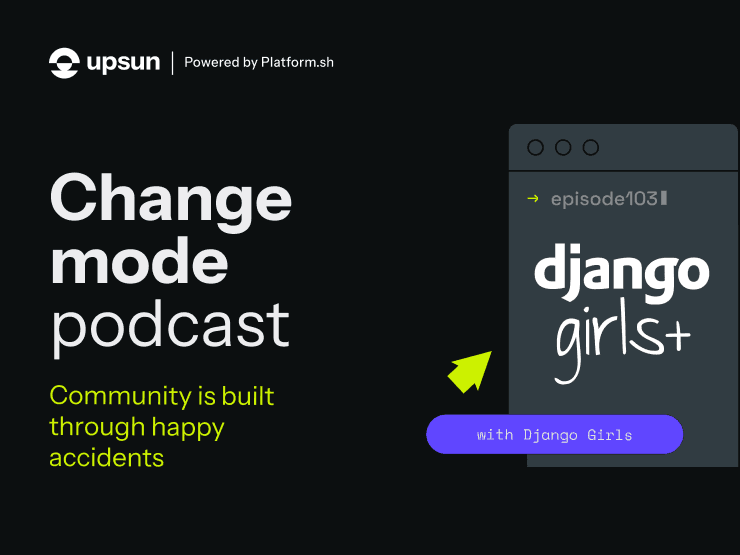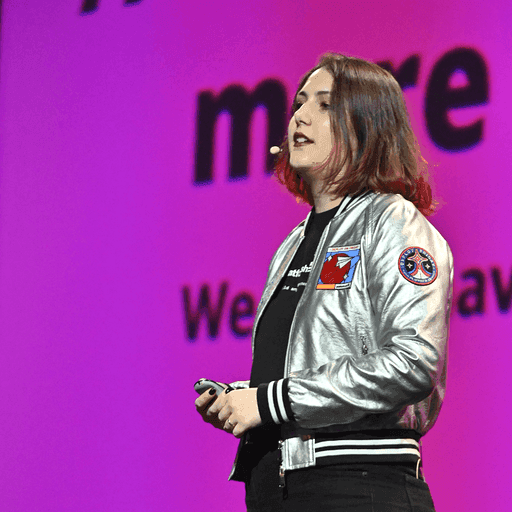
Django Girls: community, python, and open source - Podcast
Join DjangoGirls board members, Aisha Bello and Leona So, for this week’s episode of Change Mode as we celebrate 10 years of this incredible non-profit.
Created to inspire women from all backgrounds to get interested in technology and enter the world of programming, Aisha and Leona share their journeys into open source and their roles in DjangoGirls today. Dive into how they built their own Python communities, ran their own local events, and the importance of creating safe, welcoming spaces for women in tech.
Podcast transcript
We utilized ChatGPT to enhance the grammar and syntax of the transcript.
Marine: Aisha, Leona, I'm so happy to have you both. It's been hard to synchronize our agendas because we're all in different time zones and busy women, but I'm glad to have you both here. Can you introduce yourselves? What do you do, and why you're invited here? Aisha, maybe you can start.
Aisha: Hi, Marine. I'm Aisha. I'm a Django Girls board member. I've been a previous organizer and coach. On the other side, I work as a solutions architect for AWS, and I'm happy to be here today. I'm based out of Toronto currently.
Leona: And I'm Leona. I'm based in the UK, near Manchester. I was an attendee of Django Girls to start with, then became an organizer, and now I'm also a board member. I work as a product manager at Pearson.
Marine: Awesome. Thank you both. My first question is, how did you discover the technology that made you want to be involved in open source, specifically Django Girls? How did you both start getting into Python and then Django, and what made you want to get involved in the Django Girls user group? Leona, maybe you can start.
Leona: I wasn't a developer, and I'm currently also not a developer, but I've been in tech setups before. I have always been a math teacher, and computing was something the government wanted to promote a lot. One aspect of the math curriculum I was teaching needed knowledge of computing to understand the math involved. I started looking into how I could link math with computing. The last time I did any computing was in university, studying C++. When the government promoted computing, Python was chosen as the language, which is relatively straightforward. It's probably the best programming language to introduce in school.
I started going into Python-related professional development courses. One time, I planned to go to PyCon UK in 2015, where they had an education section. I realized there was Django Girls happening on the same day, so I applied for Django Girls instead of the education track. That's how it started. At the same time, I was already attending Python user groups in Manchester, the North West group. That's how it all began.
Marine: Interesting. I love that your background is in math and not computing, but Python is such a scientific tool. Aisha, what about you? How did you get into Django?
Aisha: It's a long story. I studied at an IT university where we did some C and C++, but Python wasn't part of the curriculum. Programming felt hard, and I thought it wasn't for me. While studying for my master's in the UK, I was doing a data science project using R. I started looking for job opportunities and stumbled upon EuroPython, which offered sponsorship for women. I applied, got approved, and attended Django Girls. It was my first introduction to Python and Django. I had an amazing mentor and felt a sense of belonging, even though I didn't understand everything.
When I returned to Nigeria, I organized the first Django Girls workshop, which led to the formation of the Python Nigeria community. It has grown to host conferences and events all over the country. Although I'm not a developer, I contribute to the community and work as a solutions architect.
Marine: That's really interesting. You're both not the typical profiles we expect in these communities. Usually, we expect developers. But the community made a difference for both of you and made you interested in the language. Leona, you also started your own local Django Girls group and events. How did that change your life?
Leona: After attending Django Girls at PyCon UK, I wanted to bring it to Manchester. I spoke to a friend who is now also a board member, and we started organizing events. This involvement helped me transition from teaching math to being a computing tutor. It also opened opportunities to make Django Girls bigger. The support from the community and hearing success stories from attendees kept me motivated.
Marine: That's wonderful. For me, the story is similar with the PHP and Drupal community. Open source communities give a lot but also bring a lot in return. Aisha, do you think events are necessary for building this sense of community?
Aisha: In-person events fuel online interactions. Although we've had impactful virtual events, nothing compares to the connection you feel at in-person events. The relationship begins in person and continues online. Both have their pros and cons, but if I had to choose, in-person events make a bigger impact.
Marine: You both host the Django Girls podcast. Can you tell me more about it? How did it start?
Aisha: When we joined the board, we had a blog called Django Girls Stories. I thought, what if we gave it life and let people tell their stories in their own voices? Leona and I partnered to start the podcast. Leona handles the editing, and I find people and set up meetings. It brings the stories to life and helps us connect with the community.
Marine: That's great teamwork. What are your plans for the podcast and Django Girls?
Leona: We're recording the next series of podcasts, focusing on how people in the industry got to where they are and tips for others. Our team has also grown, and we plan to promote the podcast more.
Marine: It's important to make the world aware of your work. Lastly, if you could get permission to do anything for a day, what would it be?
Aisha: I would take a self-care day with no guilt, completely switching off.
Leona: I would like the permission to do something I've never done before, like an adventure.
Marine: What do you think is your greatest power?
Leona: I've been told I'm very organized.
Aisha: I think my ability to bring people together for a common purpose.
Marine: You make a great team. Thank you both for sharing your time and insights. I hope we can do a follow-up someday. Thank you so much.
Leona: Thank you. It's lovely being here.
Aisha: Same.
